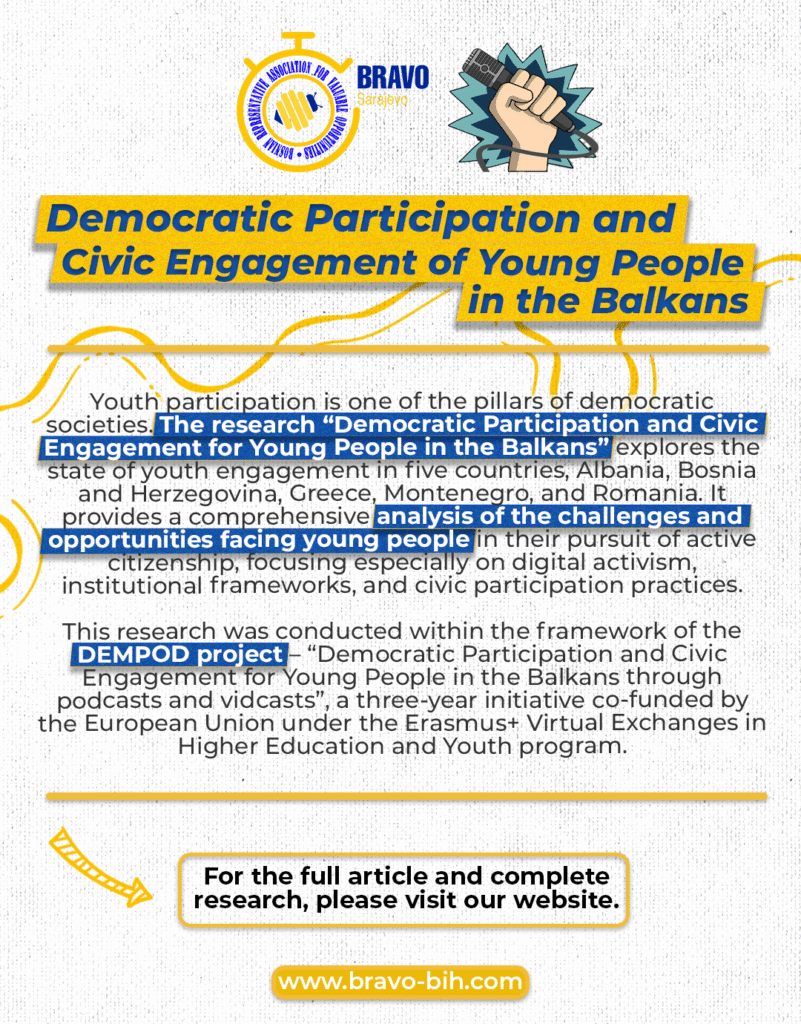
Youth participation is one of the pillars of democratic societies. The research “Democratic Participation and Civic Engagement for Young People in the Balkans” explores the state of youth engagement in five countries, Albania, Bosnia and Herzegovina, Greece, Montenegro, and Romania. It provides a comprehensive analysis of the challenges and opportunities facing young people in their pursuit of active citizenship, focusing especially on digital activism, institutional frameworks, and civic participation practices.
This research was conducted within the framework of the DEMPOD project – “Democratic Participation and Civic Engagement for Young People in the Balkans through podcasts and vidcasts”, a three-year initiative co-funded by the European Union under the Erasmus+ Virtual Exchanges in Higher Education and Youth program.
Methodology
The study combined desk research with quantitative and qualitative data collection. An online survey conducted in April – May 2024 gathered responses from 497 young people aged 18–30 across the five countries.
The survey was designed to ensure gender balance, geographical diversity, and representation of urban and rural youth. It was complemented by the collection of best practices from NGOs, youth councils, and networks, offering qualitative insights into effective models of engagement.
Key Findings
- High optimism, but limited trust: A majority (87.7%) of respondents believe their civic and political participation can bring meaningful change in their communities. However, corruption, lack of transparency, and political clientelism remain significant barriers, particularly in Albania and Montenegro
- Varied participation levels: 48.1% of youth are members of NGOs or social movements, while 42.3% reported regular voting. Yet, only 6.4% participate in youth councils or parliaments, highlighting the gap between informal activism and institutionalized participation
- Digital activism on the rise: Social media is central to youth civic engagement. Instagram (72.8%) and TikTok (47.1%) are the most used platforms for following political and social issues, while Facebook (53.1%) remains relevant among older youth cohorts. Around 7.2% of respondents even created or managed their own digital platforms for activism
- Focus of activism: Education (63.6%), youth-related activities (46.2%), human rights (35.1%), and democracy (31.7%) are the main fields of engagement. Environmental activism and climate justice are also increasingly prominent among young people (26.9%)
Challenges
Despite strong enthusiasm, youth in the Balkans face persistent obstacles:
- Low institutional trust in political parties and state authorities;
- Marginalization of youth voices, especially in Albania and Bosnia and Herzegovina;
- Socio-economic insecurity, with high unemployment rates prompting emigration;
- Unequal access to digital tools in rural areas, limiting participation opportunities.
Best Practices
The research highlights several inspiring initiatives across the region, including:
- Youth councils and structured participation mechanisms in Bosnia and Herzegovina;
- The Youth2030 Strategy in Albania, supporting transitions from education to the labor market;
- Greece’s Year of Youth 2024, designed to empower young voices in policy-making;
- Montenegro’s National Youth Strategy 2023–2027, which strengthens youth services and civic platforms;
- Romania’s cross-sectoral programs to support volunteering and non-formal education
Conclusion
The study demonstrates that young people in the Balkans are eager to shape their societies, but their energy and creativity often remain underutilized due to systemic barriers. To unlock their full potential, governments, civil society, and international actors must:
- Ensure transparency and accountability in youth-related policies;
- Invest in digital literacy and civic education;
- Create accessible and inclusive platforms for youth participation;
- Foster cross-border cooperation to amplify youth voices.
By addressing these challenges, the region can transform youth enthusiasm into sustainable democratic participation and civic engagement.
This research was carried out under the DEMPOD project, co-funded by the European Union, which aims to empower disadvantaged youth to use podcasts and digital tools as innovative means of civic participation and democratic engagement.
